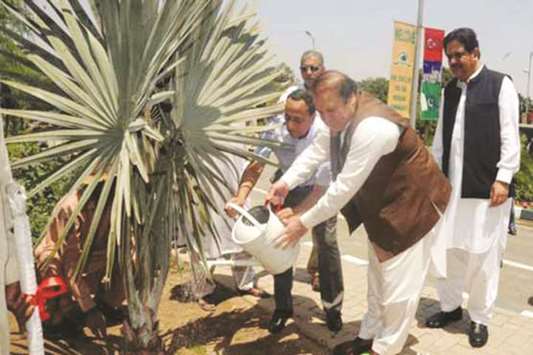More than 2mn indigenous trees have been planted throughout Pakistan so far as a part of Prime Minister’s Green Pakistan Programme.
This was stated by Mohamed Saleem, a representative of the Ministry of Climate Change, yesterday.
“Launched on February 9 this year at the Prime Minister Office, the Green Pakistan Programme aims to reinvigorate country’s ailing forestry sector through a large-scale plantation besides protecting and conserving wildlife and their habitats for revival of the overall biodiversity, which is in danger because of over-exploitation or sustainable use of natural resources,” he said.
He claimed that more than 1mn trees had been planted in Punjab followed by 409,300 trees in Sindh, 202,000 in Khyber Pakhtunkhwa, 232,400 in Balochistan, 130,500 in Azad Jammu and Kashmir, 86,330 in Gilgit-Baltistan and 87,000 trees in the Federally Administered Tribal Areas (Fata). He said 9.58mn saplings were in different nurseries set up in various parts of the country under the programme.
“These 9.58mn more saplings will be planted across the country in the next few months, particularly in watershed and areas which are vulnerable to floods, land erosion, landslides and where desertification is expanding,” Saleem added.
He said a viable mechanism had been hammered out to ensure maximum survival of the tree samplings through utmost care.
In this regard, local forest communities are also being engaged for their direct involvement in the tree plantation and their care.
Under the five-year ambitious Green Pakistan Programme, 100mn trees will be planted till 2021 at a cost of Rs10bn.
Some 50% of the cost will be met by provincial governments, Gilgit-Baltistan, AJK and Fata regions while the remainder will be extended on a yearly basis by the federal government.
Highlighting the unprecedented importance of forests in dealing with various climate change induced threats, particularly floods, desertification, wind erosion, storm-rains and heavy winds, he said forests remained a major workable solution to the negative fall-outs of climate change on Pakistan’s socio-economic sectors and lives as well as livelihoods of the people, particularly agriculture and growing air pollution.
Pakistan is home to forests over around 4mn hectares, which constitute to be 5% of the total landmass of the country.
“But the country losses forests over some 27,000 hectares every year and over 50% of the wood harvested as a result of deforestation is used for cooking, heating in households without access to gas for these basic purposes. This trend of deforestation, however, has exposed the country to the negative fall-outs of the global warming-induced climate change impacts,” he said.

File photo of Pakistan Prime Minister Nawaz Sharif launching the Green Pakistan programme.
